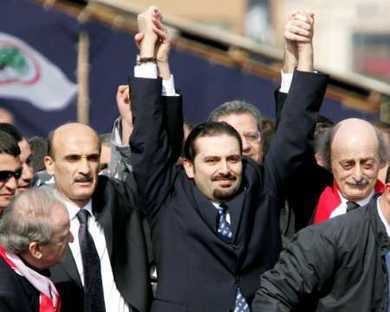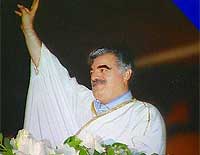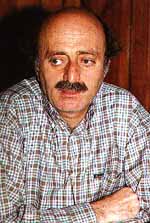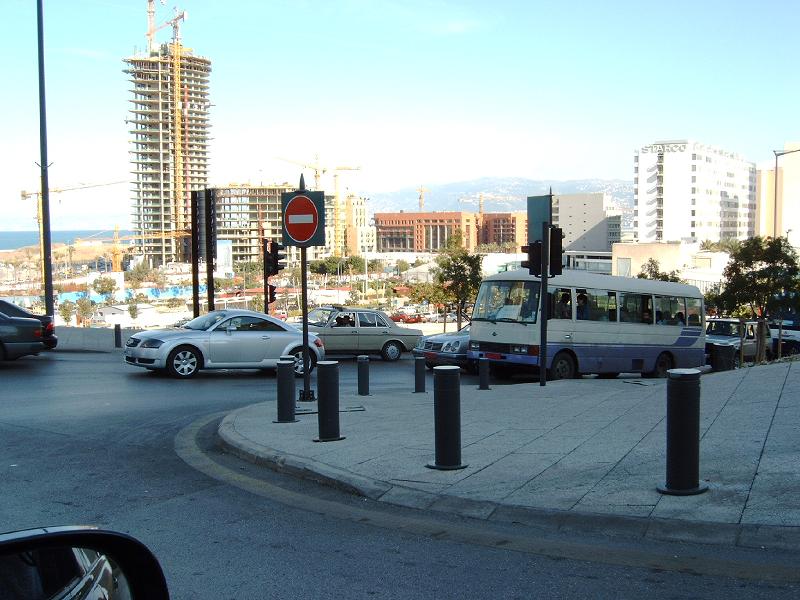 Beirut, 14 Feb. (AKI) - The son of former Lebanese premier Rafiq Hariri on Tuesday led a gathering of hundreds of thousands of people who turned out to commemorate the first anniversary of his father's assassination. But the event in Beirut's Martyrs' Square was also used by Saad Hariri and other political leaders as a platform for emotional speeches condemning Syria's meddling in Lebanese affairs. "Lebanon will not deal with those who want to supress it. Long live Lebanon. Long live Rafiq Hariri, Long live the Lebanese people," shouted Saad Hariri who stood behind a bullet-proof glass screen while people waved red-and-white Lebanese flags.
Beirut, 14 Feb. (AKI) - The son of former Lebanese premier Rafiq Hariri on Tuesday led a gathering of hundreds of thousands of people who turned out to commemorate the first anniversary of his father's assassination. But the event in Beirut's Martyrs' Square was also used by Saad Hariri and other political leaders as a platform for emotional speeches condemning Syria's meddling in Lebanese affairs. "Lebanon will not deal with those who want to supress it. Long live Lebanon. Long live Rafiq Hariri, Long live the Lebanese people," shouted Saad Hariri who stood behind a bullet-proof glass screen while people waved red-and-white Lebanese flags.
The government gave schools the day off and businesses shuttered to give way for people to participate. Thousands began gathering in the morning under in crisp cool winter weather under sunny skies, carrying Lebanese flags and pictures of Hariri. The demonstration, described as a "gathering of loyalty and national unity" on the central Martyrs' Square next to his grave, climaxes shortly after midday, the time when a huge truck bomb exploded on a downtown seaside street on Feb. 14, 2005, as Hariri's motorcade drove by, killing him and 20 others. To view pictures pls cleak "READ MORE"
 BEIRUT (AFP)-- The Lebanese capital was transformed into a massive sea of red and white flags as the country marked the first anniversary of former premier Rafiq Hariri's assassination, still struggling to unite in the shadow of its former powerbroker Syria.
BEIRUT (AFP)-- The Lebanese capital was transformed into a massive sea of red and white flags as the country marked the first anniversary of former premier Rafiq Hariri's assassination, still struggling to unite in the shadow of its former powerbroker Syria.
The government gave schools the day off and businesses shuttered to give way for people to participate. Thousands began gathering in the morning under in crisp cool winter weather under sunny skies, carrying Lebanese flags and pictures of Hariri. The demonstration, described as a "gathering of loyalty and national unity" on the central Martyrs' Square next to his grave, climaxes shortly after midday, the time when a huge truck bomb exploded on a downtown seaside street on Feb. 14, 2005, as Hariri's motorcade drove by, killing him and 20 others.
Thousands of people packed into central Beirut, waving red and white flags and pictures of the slain billionaire premier who was credited with rebuilding their country after the devastating civil war.Hariri's son Saad returned home at the weekend after six months in exile to issue an appeal for a massive turnout on the anniversary of an event that plunged Lebanon into turmoil and changed its political landscape.
"It will be a day of a renewal of faith in the unity of Lebanon," said Hariri, now the head of the anti-Syrian majority in parliament. Candlelit rallies and concerts are planned to mark the massive Beirut seafront bombing that killed Hariri and 20 other people on Valentine's Day 2005.
 The Lebanese Druze Leader Walid Junblat doubted the accuracy of maps confirming the Lebanese identity on Shebaa Farms, an area which was confiscated by Israel in 1967 during its occupation of the Syrian Golan heights.
The Lebanese Druze Leader Walid Junblat doubted the accuracy of maps confirming the Lebanese identity on Shebaa Farms, an area which was confiscated by Israel in 1967 during its occupation of the Syrian Golan heights.
The Lebanese parliamentarian who is among the majority standing against Damascus presented in the parliament Lebanese official maps that he said dats back to the year 1962, in which the Shebaa Farms are located outside the borders of the country, and compared it to another map which he said is false and he had received in 2001, in which this area is included as part of the Lebanese lands.
Junblat said that Lebanese former officials for general security lt. gen. Jamil al-Sayyed handed him the "false" map in 2001. AL-Sayyed and three of his assistants of the Lebanese security are currently held in custody over suspicion of being involved in the assassination of the former Lebanese prime minister Rafiq al-Hariri.
 By RAY HANANIA, When you get your first glimpse of Beirut flying over the Mediterranean Sea minutes past the small island of , the Lebanese city glistens like a rainbow of colors.
By RAY HANANIA, When you get your first glimpse of Beirut flying over the Mediterranean Sea minutes past the small island of , the Lebanese city glistens like a rainbow of colors.
The deep blue CyprusMediterranean sea is followed by the brown sand of the coast, the light green palm trees that reach out around the red-roofed buildings, the teal mountain brush and white snow covered mountains.
At one time, Beirut was the sparkling jewel of the Middle East, a robust tourist center that brought mingled tourists seeking oriental adventure with the wealthy whose enthusiasm for enjoyment on the city
Khazen History


Historical Feature:
Churches and Monasteries of the Khazen family

St. Anthony of Padua Church in Ballouneh
Mar Abda Church in Bakaatit Kanaan
Saint Michael Church in Bkaatouta
Saint Therese Church in Qolayaat
Saint Simeon Stylites (مار سمعان العامودي) Church In Ajaltoun
Virgin Mary Church (سيدة المعونات) in Sheilé
Assumption of Mary Church in Ballouneh
1 - The sword of the Maronite Prince
2 - LES KHAZEN CONSULS DE FRANCE
3 - LES MARONITES & LES KHAZEN
4 - LES MAAN & LES KHAZEN
5 - ORIGINE DE LA FAMILLE
Population Movements to Keserwan - The Khazens and The Maans
ما جاء عن الثورة في المقاطعة الكسروانية
ثورة أهالي كسروان على المشايخ الخوازنة وأسبابها
Origins of the "Prince of Maronite" Title
Growing diversity: the Khazin sheiks and the clergy in the first decades of the 18th century
Historical Members:
Barbar Beik El Khazen [English]
Patriach Toubia Kaiss El Khazen(Biography & Life Part1 Part2) (Arabic)
Patriach Youssef Dargham El Khazen (Cont'd)
Cheikh Bishara Jafal El Khazen
Patriarch Youssef Raji El Khazen
The Martyrs Cheikh Philippe & Cheikh Farid El Khazen
Cheikh Nawfal El Khazen (Consul De France)
Cheikh Hossun El Khazen (Consul De France)
Cheikh Abou-Nawfal El Khazen (Consul De France)
Cheikh Francis Abee Nader & his son Yousef
Cheikh Abou-Kanso El Khazen (Consul De France)
Cheikh Abou Nader El Khazen
Cheikh Chafic El Khazen
Cheikh Keserwan El Khazen
Cheikh Serhal El Khazen [English]
Cheikh Rafiq El Khazen [English]
Cheikh Hanna El Khazen
Cheikha Arzi El Khazen
Marie El Khazen